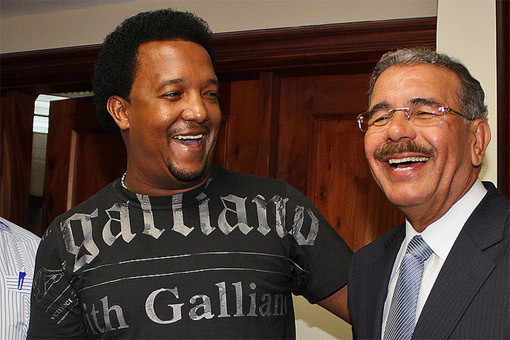As the most credited polls predicted, Danilo Medina of the governing Partido de la Liberación Dominicana (PLD) won a decisive victory on Sunday, May 20, in the first-round presidential election in the Dominican Republic.1 Medina and his running mate, First Lady Margarita Cedeño de Fernández, obtained 51.21 percent of the votes versus 46.95 percent for former President Hipólito Mejía of the Partido Revolucionario Dominicano (PRD). This is the third consecutive presidential election won by the PLD; President Leonel Fernández was elected in 2004 and re-elected in 2008.
Medina won the election through victories in four of the five largest cities. In Santo Domingo, Medina finished ahead of Mejía by over 13 percentage points; in the Province of Santo Domingo, which surrounds the capital city, he had nearly an 11 percentage point margin of victory. Clearly the urban, middle-class vote was a key factor in the PLD win.
The PLD and PRD, with their allies, obtained 98.16 percent of the votes cast with the other four candidates splitting the remaining 1.83 percent of votes, which represents a degree of political polarization not seen in they country since the 1970s. The third-largest party, Partido Reformista Social Cristiano (PRSC), did not present a presidential candidate for the first time since 1966 due to internal divisions that linger after the death of its leader, Joaquín Balaguer, in 2002. The PRSC instead supported the PLD and Danilo Medina.
A number of factors helped Medina to win the presidency. Undoubtedly, key segments of the electorate, especially the middle and upper-middle classes in urban centers, saw Medina as continuing the economic policies of Leonel Fernández’ eight years in office. Currency stability, economic growth and infrastructure investment—all part of Fernández’ legacy—helped a campaign where the main theme was continuity for what is working and fixing any items that need attention.
Medina also benefitted from a unified PLD, with President Fernández leading the support of his candidacy. Past differences between the president and now president-elect had cast doubt over the extent of his endorsement at the beginning of the primary process. Medina also counted with the support of a broad coalition of small parties to help him obtain a majority of votes and avoid a runoff election.
Without previously serving as president, Medina also could present himself as the embodiment of the “safe” change that the country needed as opposed to the “unpredictable” change that Hipólito Mejía represented. Medina, a seasoned politician, projected himself as someone with deep knowledge and serious proposals to address the country’s problems but with a noticeable lack of charisma in a country accustomed to charismatic political leaders.
For his part, polls indicate that Mejía’s candidacy was strengthened by social dissatisfaction with public insecurity, unemployment, the cost of living, and corruption. Together with a historically solid block of PRD voters, this dissatisfaction explains the high percentage of votes obtained by Mejía despite some weaknesses in his candidacy.
Still Mejía could not get past some of the serious mistakes made during the last weeks of the campaign; these blunders may have cost him at least two or three percentage points on election day. Notable missteps included saying that he would not pay past governments debts and would ask rice producers not to pay their bank debts. He also announced elimination of the popular Solidaridad social program and then tried to reverse course on this statement. Mejía also struck an unpopular chord when he proclaimed that he would change the Supreme Court’s judges even though he has no constitutional authority to do so. All of this interrupted the momentum he had a couple of months before the elections; meanwhile Danilo Medina was virtually mistake-free during the long campaign.
Beyond these blunders, Mejía was unelectable for two additional reasons. The first was his own presidency (2000-2004), when the country lived through one of its worst economic crises—a result of three banks collapsing due to fraud and fiscal and monetary policy mismanagement during the crisis. Memories of this period played an important role in the middle and upper-middle classes supporting his challenger.
Internal party divisions also adversely affected the Mejía campaign. His victory in the primaries was questioned by rival and former presidential candidate Miguel Vargas Maldonado, who refused to reconcile with Mejía. Vargas Maldonado and his followers remained absent from the electoral campaign, taking away a significant number of votes from Mejía.
Although there we some irregularities, electoral observers, both foreign and nationals, especially the OAS Electoral Observation Mission, considered the incidents to be minor, and praised the organization of the elections and the civic nature of the Dominican people.
In the end, smart campaigning and the Fernández legacy allowed Medina to do what was thought to be unachievable just six months ago: winning outright in the first round and avoiding a runoff. Governing will be his next test.
1 Polls courtesy of Gallup, Penn, Schoen & Berland, Greenberg Quinlan Rosner, and Beneson Strategy Group.








